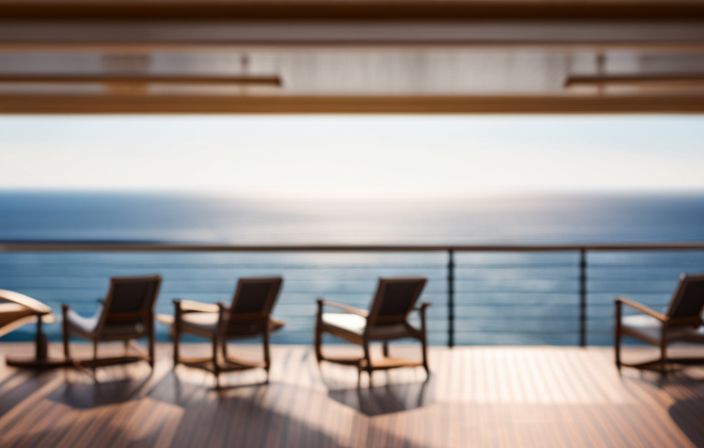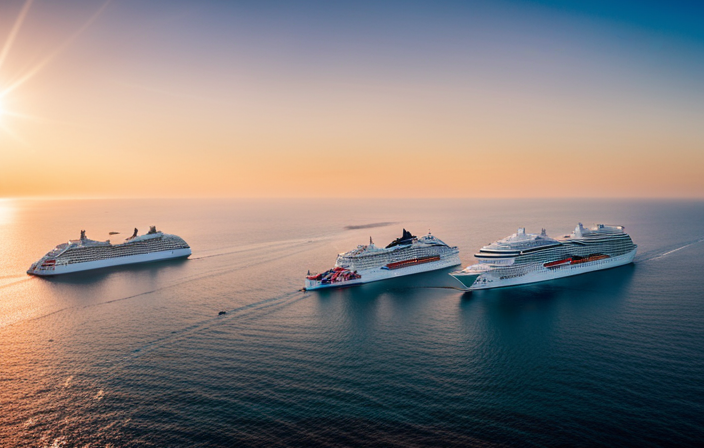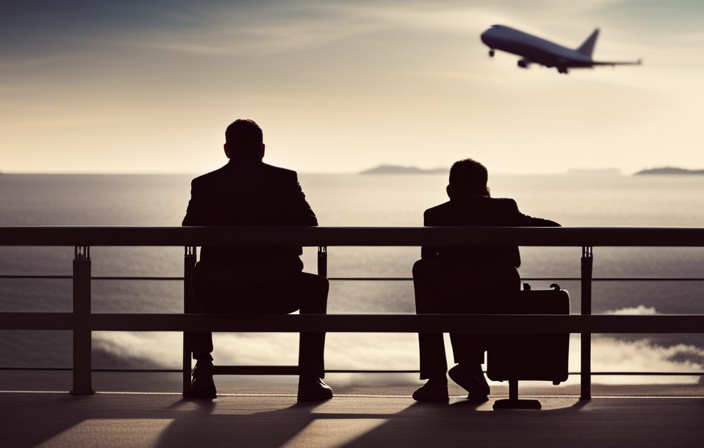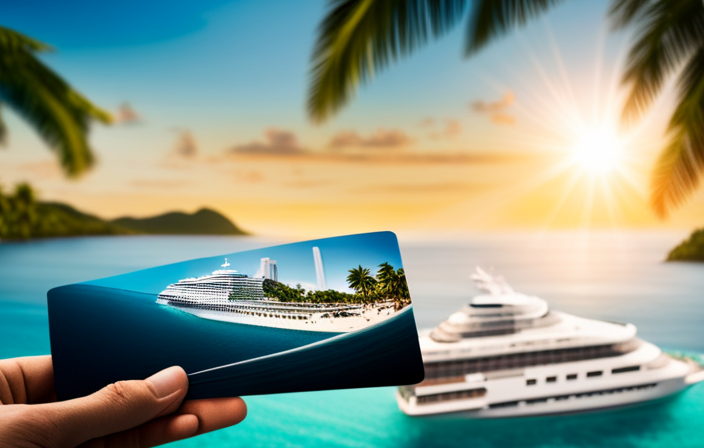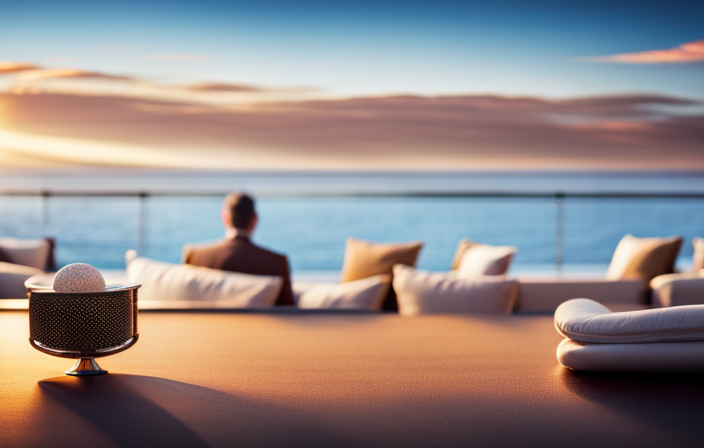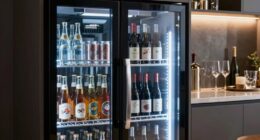Have you ever wondered how people manage to go overboard from cruise ships? Considering the massive size and seemingly secure environment of these oceanic sanctuaries, it seems like a highly unlikely event. Yet, it happens more often than one might think. A combination of unfortunate circumstances, reckless behavior, and sometimes deliberate acts leads to individuals falling into the vast sea.
In this article, we will delve into the various reasons behind these incidents, shedding light on the hidden dangers and vulnerabilities that exist on these luxurious vessels. From slip and trip hazards to intoxication and impaired judgment, we will explore the factors that contribute to these unintentional falls.
We will also examine the darker side of this phenomenon, addressing mental health issues, suicidal attempts, and deliberate acts of self-harm. So, fasten your seatbelts and prepare to navigate the treacherous waters of cruise ship safety.
Key Takeaways
- Falling off cruise ships can be attributed to suicidal attempts or deliberate acts of self-harm, highlighting the need for preventive measures and psychological support.
- The implementation of barriers and surveillance cameras by cruise lines can help prevent incidents of falling off cruise ships, but psychological support is also crucial in identifying and assisting individuals at risk.
- Adhering to safety guidelines and regulations is of utmost importance to prevent falling overboard, as failure to do so can have serious consequences.
- Being prepared and educated through safety drills, familiarization with life jackets and emergency exits, and knowledge of emergency procedures and safety protocols can ensure a safer and more enjoyable cruise experience.
Unintentional falls due to slip and trip hazards on deck
Unintentional falls on board cruise ships often occur due to slip and trip hazards found on deck, causing passengers to lose their footing and potentially fall off the ship. Slip resistance measures play a crucial role in preventing these accidents. Cruise ship decks should be equipped with slip-resistant materials to provide better traction for passengers, especially in areas prone to wetness, such as pools and water slides.
Regular deck maintenance and inspection are also essential to identify and address any potential hazards promptly. This includes checking for loose handrails, uneven surfaces, and any other obstructions that could lead to slips or trips. By implementing these preventive measures, cruise ship operators can significantly reduce the risk of unintentional falls.
Transitioning to the next section, intoxication and impaired judgment can also contribute to accidental falls.
Intoxication and impaired judgment leading to accidental falls
Impaired judgment due to intoxication can result in a momentary lapse in balance and an accidental plunge from the deck of a luxury liner. While it may seem unlikely, excessive alcohol consumption can lead to tragic accidents on cruise ships. When individuals consume alcohol in large quantities, their judgment becomes impaired, affecting their ability to maintain balance and make rational decisions. This impaired judgment can create a dangerous situation, especially on the open decks of a moving ship.
It only takes a split second for someone to lose their footing and fall overboard. Therefore, it is crucial for passengers to be mindful of their alcohol consumption and understand the potential risks associated with impaired judgment. Transitioning into the subsequent section about reckless behavior and leaning over railings, it is important to explore how these actions can also contribute to accidental falls.
Reckless behavior and leaning over railings
Be careful not to lean too far over the railings, as it can lead to dangerous situations on a luxury liner. Reckless behavior and leaning over railings are common causes of falls from cruise ships.
To prevent such incidents, it’s essential to take preventive measures and exercise caution while enjoying the beautiful views. Cruise ship crew members are trained to intervene and ensure passenger safety. They actively patrol the decks and remind passengers about the potential dangers of leaning too far over railings.
Additionally, crew members may restrict access to certain areas or install physical barriers to prevent passengers from getting too close to the edge. However, despite these preventive measures and crew intervention, accidents can still occur due to the lack of safety precautions and barriers on the ship, which will be discussed in the subsequent section.
Lack of safety precautions and barriers on the ship
Watch out for the lack of safety precautions and barriers on the ship, it can put you at risk. When it comes to cruise ship safety, the effectiveness of barriers and availability of safety equipment are crucial. Unfortunately, some cruise ships have inadequate safety measures in place, which can lead to tragic accidents.
Imagine being on a ship where there are no barriers to prevent you from falling overboard. It’s a terrifying thought, isn’t it? Now, take a look at this table:
| Lack of Barriers | Availability of Safety Equipment |
|---|---|
| Increased risk | Limited protection |
| Higher chances | Inadequate resources |
| Dangerous | Insufficient provisions |
| Potentially fatal | Lack of preparedness |
This table highlights the dire consequences of a lack of safety precautions and barriers on a cruise ship. It is essential for cruise lines to prioritize the installation of effective barriers and ensure the availability of sufficient safety equipment. Without these measures, passengers are left vulnerable to accidents and potential tragedy.
Inadequate safety precautions, however, are not the only factor that can lead to falls overboard. Rough weather conditions and high waves can also cause passengers to lose their balance. But more on that in the next section.
Rough weather conditions and high waves causing passengers to lose balance
Imagine yourself on a ship, the wind howling and the waves crashing against the sides, causing you to lose your balance. Rough sea conditions can be a major cause of falls off cruise ships. When the sea is rough, with high winds and towering waves, it becomes difficult to maintain stability. Passengers may stumble or be thrown off balance, leading to potentially dangerous situations.
The impact of high winds can be especially problematic, as it can create a force that pushes against individuals, making it even harder to stay upright. As a result, people may lose their footing and accidentally fall overboard. These challenging weather conditions highlight the importance of safety precautions and barriers on cruise ships.
However, it’s not just the weather that can lead to falls overboard; medical emergencies or sudden illnesses can also contribute to these incidents.
Medical emergencies or sudden illnesses leading to falls overboard
While rough weather conditions and high waves can certainly cause passengers to lose their balance and fall off cruise ships, another significant factor that contributes to people falling overboard is medical emergencies or sudden illnesses. These unexpected health crises can occur at any moment, leaving individuals disoriented and vulnerable to accidents. Whether it’s a heart attack, stroke, or sudden loss of consciousness, a medical emergency can quickly lead to a fall overboard if immediate assistance isn’t provided.
It’s crucial for cruise ships to have well-equipped medical facilities and trained medical staff onboard to respond quickly to these situations. Additionally, passengers should be aware of their own health conditions and take necessary precautions to prevent any sudden illnesses while onboard. To emphasize the importance of this issue, consider the following key points:
- The unpredictable nature of medical emergencies can make it challenging to prevent falls overboard.
- Prompt medical attention is crucial in preventing accidents and ensuring passenger safety.
- The availability of well-equipped medical facilities and trained staff is essential on cruise ships.
- Passengers should disclose any pre-existing medical conditions to the cruise ship staff for proper care.
- Personal responsibility and awareness of one’s health can greatly reduce the risk of falling overboard.
Transitioning into the subsequent section, it’s also important to address the issue of individuals intentionally going overboard as a result of mental health issues.
Jumping or intentionally going overboard as a result of mental health issues
Jumping or intentionally going overboard due to mental health issues can have devastating consequences and requires increased awareness and support onboard cruise ships.
Mental health awareness is crucial in identifying individuals who may be at risk of self-harm and providing them with the necessary support. Cruise ships should implement comprehensive training programs for staff members, enabling them to recognize signs of distress and intervene appropriately.
Support systems for passengers should include access to mental health professionals, counseling services, and helplines that are available 24/7. Additionally, creating a non-judgmental and compassionate environment where individuals feel comfortable discussing their mental health concerns is essential.
By prioritizing mental health awareness and providing robust support systems, cruise ships can play a vital role in preventing tragedies at sea.
Transitioning into the subsequent section about suicidal attempts or deliberate acts of self-harm, it is crucial to understand the underlying factors that contribute to such actions.
Suicidal attempts or deliberate acts of self-harm
In the depths of despair, individuals may resort to desperate measures, inflicting harm upon themselves in a plea for release from their inner torment. When it comes to cruise ships, suicidal attempts or deliberate acts of self-harm can result in passengers falling overboard. Addressing this issue requires a multifaceted approach that includes both preventive measures and psychological support for passengers. Cruise lines have implemented various suicidal prevention measures, such as placing barriers on deck railings or installing surveillance cameras to monitor the ship’s perimeter. Additionally, providing psychological support for passengers is crucial in identifying and assisting those who may be at risk. Trained professionals onboard can offer counseling services and create a safe space for individuals to express their emotions. However, despite these efforts, there are still instances where passengers fall off cruise ships due to failure to follow safety guidelines and regulations provided by the cruise line.
Failure to follow safety guidelines and regulations provided by the cruise line
Make sure to adhere to all safety guidelines and regulations provided by the cruise line to ensure a smooth and enjoyable voyage. Failure to follow safety guidelines and negligence in following regulations can lead to dangerous situations, including the risk of falling off a cruise ship.
It is essential to pay attention to safety briefings, understand evacuation procedures, and familiarize yourself with the ship’s layout. Ignoring safety instructions or engaging in reckless behavior could put yourself and others at risk. Cruise lines have these guidelines in place to prioritize the safety of their passengers, and it’s our responsibility as passengers to follow them.
By doing so, we can minimize the chances of accidents and create a safer environment for everyone on board. Understanding the importance of safety drills and education for passengers on board is crucial for a successful and safe cruise experience.
Importance of safety drills and education for passengers on board
Ensure your safety and the safety of others onboard by actively participating in safety drills and educating yourself about emergency procedures. Safety training is a crucial aspect of any cruise ship experience, as it equips passengers with the necessary knowledge and skills to respond effectively in case of an emergency.
By familiarizing yourself with emergency procedures, you can confidently navigate through potentially life-threatening situations. Here are three key reasons why safety drills and education are essential:
-
Rapid response: Safety drills allow passengers to practice evacuation procedures, enabling them to react quickly and efficiently in an emergency.
-
Familiarity with equipment: By participating in safety drills, you become familiar with life jackets, emergency exits, and other safety equipment, increasing your chances of using them correctly during a crisis.
-
Building confidence: Knowledge of emergency procedures and safety protocols instills confidence in passengers, empowering them to stay calm and assist others in times of need.
Remember, being prepared and educated ensures a safer and more enjoyable cruise experience for everyone on board.
Frequently Asked Questions
Are there any safety precautions in place to prevent unintentional falls due to slip and trip hazards on deck?
I’m no sailor, but when it comes to safety precautions on cruise ships, preventing unintentional falls due to slip and trip hazards on deck is a top priority. Adage: "An ounce of prevention is worth a pound of cure."
How often do incidents of intoxication and impaired judgment leading to accidental falls occur on cruise ships?
Incidents of alcohol-related falls and impaired judgment leading to accidental falls on cruise ships can occur, especially when passengers consume excessive amounts of alcohol. Additionally, the effects of medication on balance can further increase the risk of falls.
What measures are taken to prevent reckless behavior and leaning over railings?
To prevent falls overboard and reckless behavior, cruise ship operators implement extensive measures. Crew members undergo rigorous training to identify and address potential risks, while safety protocols like rail height requirements and surveillance systems are enforced to ensure passenger well-being.
Are there any safety barriers or precautions in place on cruise ships to prevent falls overboard?
Yes, cruise ships have safety barriers and precautions in place to prevent falls overboard. These include high railings, surveillance cameras, and crew members patrolling the deck. Additionally, safety protocols and emergency response plans are implemented to address any potential incidents.
How do rough weather conditions and high waves affect the stability of cruise ships, and what safety measures are implemented to prevent passengers from losing balance and falling overboard?
During rough weather conditions, cruise ships can experience instability due to high waves. To ensure passenger safety, cruise ships implement various safety measures such as stabilizers, railings, and non-slip surfaces to prevent passengers from losing balance and falling overboard.
What safety measures prevent cruise ships from sinking and how do they relate to the risk of falling off a cruise ship?
Cruise ship safety measures, such as reinforced hulls and extensive crew training, minimize the cruise ship sinking risk explained. Similarly, these measures also help prevent passengers from falling off the ship by implementing sturdy railing and strict safety protocols. Overall, these precautions ensure a safer and more secure cruising experience for everyone on board.
Conclusion
In conclusion, it’s crucial for cruise ship passengers to be aware of the various factors that can lead to falls overboard. Slip and trip hazards, reckless behavior, and lack of safety precautions all contribute to these accidents.
Additionally, rough weather conditions and mental health issues can also play a role. Ultimately, it’s the responsibility of both the cruise line and the passengers to prioritize safety and follow guidelines and regulations.
By educating themselves and participating in safety drills, passengers can help prevent these incidents and ensure a safer cruise experience.

